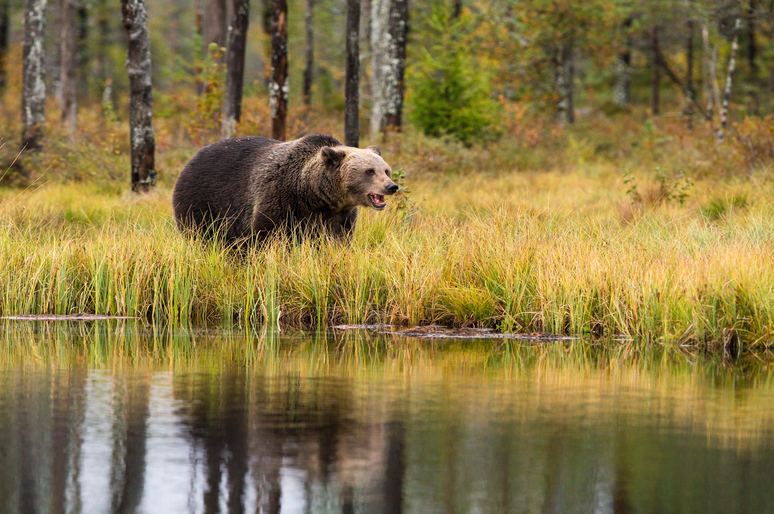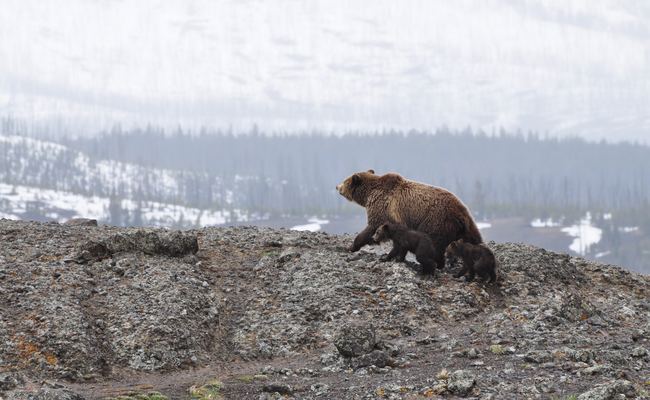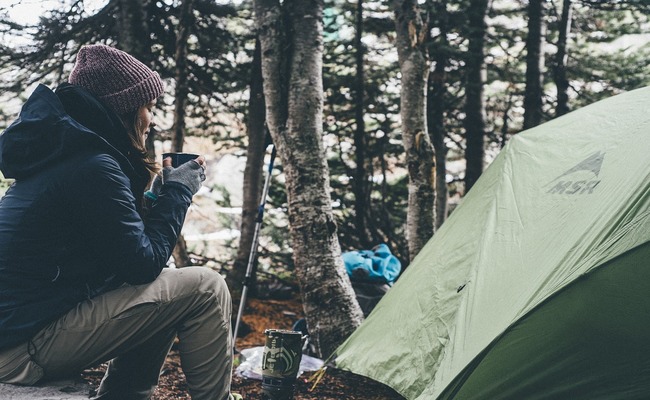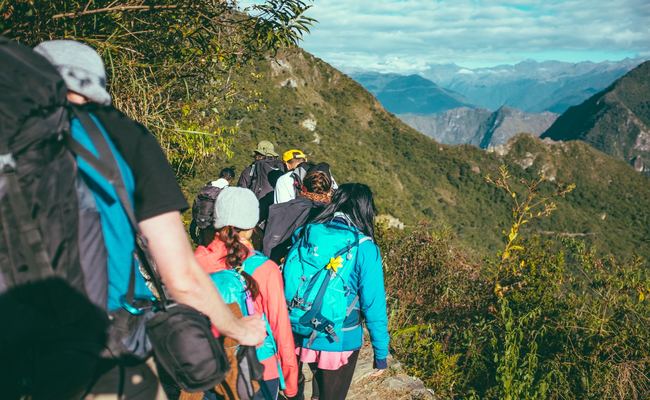How to Survive a Bear Encounter & Attack: Top 9 Life-Saving Methods

What should you do if you see a bear while hiking, camping or in your yard? Run or play dead immediately?
Hold on! You might be risking your life by adopting the wrong solutions. To survive a bear encounter or attack, stay calm, use your head rather than your feet. With the practical tips below, both you and the bear will leave safely without any injuries.
Bear Encounter 101: Are You Really Prone to Bear Attacks
Due to the effective bear conservation and regulated hunting, you are more likely to meet a bear than decades ago as bears are rebounding in North America with an estimated bear population of 900,000.
If you see a bear in the wild or in your yard, it is important to know which bear you are dealing with. Generally speaking, black bears are smaller and shy animals that will escape on their own from a potential encounter with humans.
Brown bears, a species that includes grizzly bears, are bigger and more aggressive. When you see a brown bear in the wild, you are 21 times more likely to be injured than the average black bear encounter, as the research by the University of Calgary on fatal bear attacks indicates.
It also points out that there are millions of interactions between humans and bears in the wild without any human injuries.
Yes, fatal bear attacks do exist.
But at a very slim rate:
National Park Service states that the chances that you get injured by a grizzly bear are about 1 in 2.7 million. In other words, it is more possible that you get killed by a dog or a spider than a bear.
More specifically, bears make contact with humans and attack, rather than shy away, for the main three reasons:
- You have stepped into the bear’s home range.
- Bears believe you’ll grab their food while they’re eating.
- They treat you as a threat to their cubs. (Leave asap when seeing cubs in the wild.)

What to Do If You Encounter a Bear While Hiking/Camping
Chances are that you encounter a bear while you are hiking or camping. In this part, you will learn what to do if you see a bear.
The first thing you need to do: don’t get frightened. Most bear encounters won’t result in an injury. By adopting the useful tips below, you will be safe if you see a bear while camping or hiking:
What Shouldn’t You Do If You See a Black Bear
- Don’t panic. Most bears are shy and retiring animals, which will retreat to avoid direct contact with humans. A good answer to “what to do if you see a bear” is to adjust your breath, stay calm just like you meet another backpacker on the trail to deal with any possible incidents during the encounter.
- Don’t approach the bear to take photos. Of course you can do so within a safe distance of up to 350 feet. But if you keep moving towards them, they will treat you as a great threat and fight back.
- Don’t turn your back and run. Another big no-no to “what to do if you see a grizzly bear” is running away immediately. Grizzly bears will prey on you the instant you run away. Note that their running speed can reach 15 meters per second while that for the average human is around 6 to 8 m/s. So you may understand that you won’t win a predatory bear, at least not in the running.
- Don’t leave your food available to the bears. You’d better pay special attention to your food when camping. When the bears in the wild treat human campsites as their food source, the number of bear encounters and bear attacks may increase correspondingly.

What Should You Do If You See a Black Bear While Hiking
- Make your presence known by the bears. Curious bears may approach you for identification purposes. To make the bear “understand” that you are a human but not their prey, you may talk in an appeasing way and ask them to leave like saying “go away, bear!”.
- Haze the bears. Even brown bears in the wild won’t offend creatures that are bigger than themselves. So, to survive a bear encounter, you may play big by waving your arms, tree branches, or any other handy materials.
- Back away slowly. When you see a bear on the trail, it is best to withdraw slowly without turning your back. Besides, to survive a bear attack, you may step on the giant rocks to make yourselves look bigger in the eyes of the bears.
- Look for shelters. In case that the bear stalks after you, you may hide in a vehicle or a building near you and leave until the bear is out of your sight.
- Use bear spray & handy sticks. Such useful tools will help you survive a bear encounter when the bear is approaching you.
Research (PDF file) taken by the US Fish and Wildlife Service shows that among those who defend themselves against a bear attack with bear spray, very few are injured while 50% suffer from injuries for defending themselves with a weapon.
What will scare the bears away:
• Bear spray (highly-concentrated pepper spray)
• Air horn
• Ultrasonic deterrents
How to Reduce Bear Encounters When Camping/Hiking
It does not necessarily mean that everyone goes hiking or camping would encounter bears in the wilderness. However, the risk exists.
To lower the possibility that you see a bear in the wild, we have collected some feasible solutions for your reference:
Tip 1. Make a Research on the Places That You Plan to Hike/Camp
Before going hiking, it is important for you to make a throughout research on your destination: whether it is in a bear country, if there are any closed areas for bear management or any public service stations for the emergency.
Tip 2. Stay Alert
It is best that you keep a watchful eye on your surroundings when hiking or camping. Listening to music while backpacking will deafen you from the suspicious sounds that indicate potential troubles.
Tip 3. Make Some Noise While Hiking
As mentioned above, black bears are shy animals that are unwilling to be noticed by human beings. To survive a bear encounter, you can make some noise, like singing or clapping hands. By doing so, you are in fact driving the bears away from you.
Tip 4. Keep Your Food Sealed
Brown bears have a strong sense of smell and they will come to you if you have left the food exposed to the air. Therefore, to avoid any interactions with bears in the wild, it is best to seal all your food with bags or covers.
Tip 5. Don’t hike at dawn or dusk.
Brown bears or black bears are able to hide in the woods with their dark color fur. You are putting yourself into danger to hike at dawn or dusk, since you may find it impossible to tell where the bears are without enough lighting.
Tip 6. Go Hiking in a Group with 3 or More People
Hiking groups of more than 2 people are less likely to be attacked by grizzly bears in the wild.

Even if the group is targeted by predatory grizzlies, coyotes or even tigers, group members can stand close to each other and form a bigger figure to scare off brown bears.
What have I missed? Do you have any particular solutions on what to do if you see a bear? If there are any, please kindly share your experience in the comment section and we’ll love to hear from you.
What to Do When You See a Bear in the Yard or Neighborhood
Aside from the wilderness, sometimes you will surprisingly find out that a bear is rolling over the trash cans in your neighborhood. Or even more shockingly, in your yard!
So, what should you do if you see a bear in your yard or neighborhood?
Here are some useful solutions to follow:
1. Scare Off Bears in Your Yard
If you see grizzlies in the yard, you may make some big noise and scare them off your property:
• Bang on the pans and the metal handrails
• Use air horn or other ultrasonic deterrents
• Clapping hands & yelling at them
Note: To ensure your safety, it is best to deter bears when you are inside the house, at an open window or in other indoor location.
2. Make Sure You Are Not Blocking the Bear’s Escape Route
After being deterred away from the human being’s property, bears in your neighborhoods tend to go back in their original path. If the path is blocked, they may linger around your property to find another possible route.
3. Install Security Cameras to Monitor Your Property
Aside from leaving black bears devastating your well-managed garden, you may use security cameras to catch them in the act.
Below is a video sample shared by a Reolink user Alex, showing a naughty black bear is tempering with the pumpkins at Alex’s front door.
With security cameras installed in the yard, you are able to scare the bears away by broadcasting the customized voice alerts or speaking to them with the 2-way audio built in the CCTV cameras.
In this way, you are able to chase grizzlies, coyotes and other aggressive animals out of your yard at home without stepping out.
And it proves to work by another Reolink user Tiffany, who uses the 2-way audio of Reolink cameras to deter a coyote preying on her chicken away from her yard.
4. Do Not Feed Black Bears in Your Neighborhood
This is one of the golden rules for everyone in the neighborhood shall follow. Once the black bears connect your living areas to food sources, they will come back frequently to hunt.
Without doubts, it may lead to more human-bear and pet-bear interactions. For the safety of your pets, your neighbors and yourself as well, it is vital that all your neighbors stop feeding bears.
5. Use Trash Cans with Tight Lids
Even if everyone in the neighborhood stops feeding the animals, they might still come back.
Why? They can still look for some food from the uncovered trash cans or leftover that are disposed of randomly.
The following CCTV footage shall be the best example.
In this video, a black bear flips over three trash cans with tight lids in search of food. However, it fails since it can’t open the well-covered trash cans.
6. Keep Your Pets on Leash/Attended
As a survey indicates, half of the bear attacks on dogs in North America involve a dog off leash. That is to say, your pet dogs are at risk if you leave them alone in the garden or walking the dog without using a leash.
In fact, no matter there are bears, coyotes or other predatory animals in your neighborhood or not, it is best to keep your pets on leash and attended for their safety.
7. Remove Plants That Attract Bears
To keep brown bears away from your yard, it is best to be careful about the plants in your yard as well. For example, berries and fruit trees are within the bear’s diet, which may attract them to your garden.
What to Do If a Black Bear/Grizzly Bear Attacks You
Fatal bear attacks are very rare:
Each year there is slightly more than one case per year since 1960 in North America (it is still tragic).
Just in case that you may experience attacks from bears, wolves, coyotes or other predatory animals, here are some tested solutions on how to survive a deadly grizzly bear attack:
Tip 1. Understand the Signs of a Bear Attack
When the bear stands on its back legs, it is trying to identify you but not to attack you.
But when it makes some unpleasant sound while slapping its paws, it is obvious that the bear is pissed off and warns you to leave for more space.
At this point, you may use your bear spray, back away slowly without any injuries.
Tip 2. Know When to Play Dead/Fight Back
It depends on which bear that you are dealing with.
If it is a black bear: Resort everything within your reach to fight back – using bear spray or throwing stones towards the bears. Also, it is also a good solution to escape to a vehicle, a building or climb up a tree at least 10 feet high (bears are good climbers as well!).
If it is a grizzly bear/female grizzly: You are very likely to survive a fierce bear attack by playing dead when grizzlies chase you.
Staffs in Yellowstone National Park discover that 75% visitors who play dead during bear encounter suffer from minor injuries when 80% hikers get severe injuries by fighting back.
The most protective position is “Cannonball”: roll on your stomach, clasp your hands behind your neck, bury your face in knees and remain still.
At this moment, the bears may lose interests and leave.
But if the grizzlies keep attacking you, you can forget everything mentioned above but to fight back in any possible ways: yell, throw rocks, use bear spray to deter the aggressive bears.
Tip 3. Leave Until the Bear Is at Least 350 Feet Away
If the brown bears leave you, you’d better wait until they go for about 30 minutes before getting up and leave. Or else, the grizzly bears may come back……another crisis!
FAQs
Will yelling at a bear scare it away?
Yelling at a bear may not reliably scare it away because the bear's response can vary based on factors like the bear's temperament and the context of the encounter. In some cases, loud noises or aggressive gestures might startle a bear and cause it to retreat, but it's generally safer to remain calm and slowly back away to avoid escalating the situation.
Can a human survive a bear attack?
Yes, humans can survive bear attacks, but it's important to take proper actions during the attack. In most cases, people should try to try to avoid confrontations with bears and follow safety guidelines when in bear country.
Conclusion
Avoiding bear attacks involves a series of tracks and methods. Have you ever seen a bear while hiking, camping or in your yard? Share your experience and how you deal with the black/brown bears in the comment below!
Search
Subscribe for the Latest Updates
Security insights & offers right into your inbox
